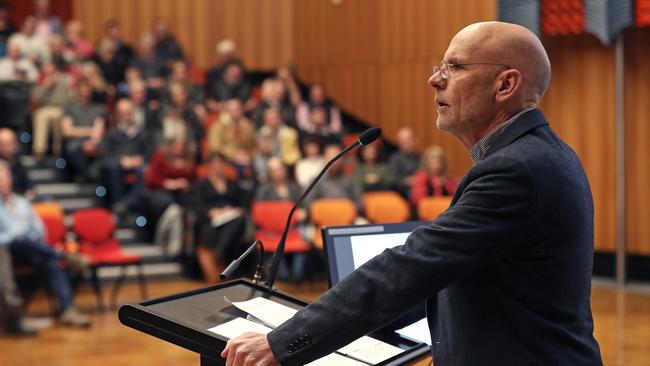Academic Clive Hamilton warns that Tasmania is a soft target for China
AN academic argues that Tasmania has made itself vulnerable to economic coercion as its education and tourism sectors became “unduly dependent” on Chinese demand.

Tasmania
Don't miss out on the headlines from Tasmania. Followed categories will be added to My News.
ACADEMIC Professor Clive Hamilton has argued that Tasmania has made itself vulnerable to economic coercion as its education and tourism sectors became “unduly dependent” on Chinese demand.
The author of Silent Invasion told a sold-out crowd at the University of Tasmania on Tuesday night that the Chinese government was interested in the state’s agricultural land and proximity to Antarctica.
Tasmania’s “uncritical embrace” of Beijing had made it a soft target for Chinese Communist Party influence, Professor Hamilton claimed.
“It’s well known that Beijing influence activities often target countries and regions that are relatively poor and hard done by,” Prof Hamilton said.
“After collecting a mass of evidence, and consulting a number of experts, I have concluded that for some time a concerted campaign has been under way to extend the Chinese Communist Party’s political influence in Tasmania.”
MORE:
HODGMAN GOVERNMENT ‘UNHEALTHILY CLOSE’ TO CHINA
CHINESE BID TO ‘NAIL’ TASMANIAN POLITICS
Prof Hamilton’s evidence of the Chinese government’s interest in the state included the creation of Hobart-based groups linked to the Communist Party’s chief influence agency, United Front, including the Australian Council for the Promotion of Peaceful Reunification in China, the Shangainese Association and the Fujian Association.
The reinvigoration of the Chinese government-backed Chinese Students and Scholars Association at UTAS was also mentioned.
“With increased scrutiny of Chinese Communist Party influence operations coming from Canberra, and new laws against foreign interference, strengthening CCP influence in outlying states may be a prudent tactic for maintaining influence in the nation,” Prof Hamilton said.
“Tasmania might be the soft underbelly of Australia as we harden our defences across the north of the continent.”

Prof Hamilton said the state should “of course … try to build good, sustainable economic links with the People’s Republic of China” but urged Tasmania not to be naive.
Speaking ahead of Professor Hamilton’s talk, Asia Institute of Tasmania director Professor James Chin said arguments about Chinese influence in Tasmania should be taken “with a grain of salt”, acknowledging United Front activities in Sydney, Melbourne and Canberra.
“People are afraid because when they go to places like Sandy Bay they suddenly see Chinese buyers buying up stuff,” Professor Chin said.
“My point is that if these people were white or from the Mediterranean or other parts of the world, would we be worried?”
Tasmania recorded a 63 per cent increase in Chinese tourism last year, with people from that country making up 13 per cent of international visitors to the state.
Chinese students last year made up the largest international group at UTAS with 1000 enrolments.
The UTAS 2017 annual report noted a 90 per cent increase in the number of commencing Chinese students but also listed a key challenge as “increased reliance on China”.


